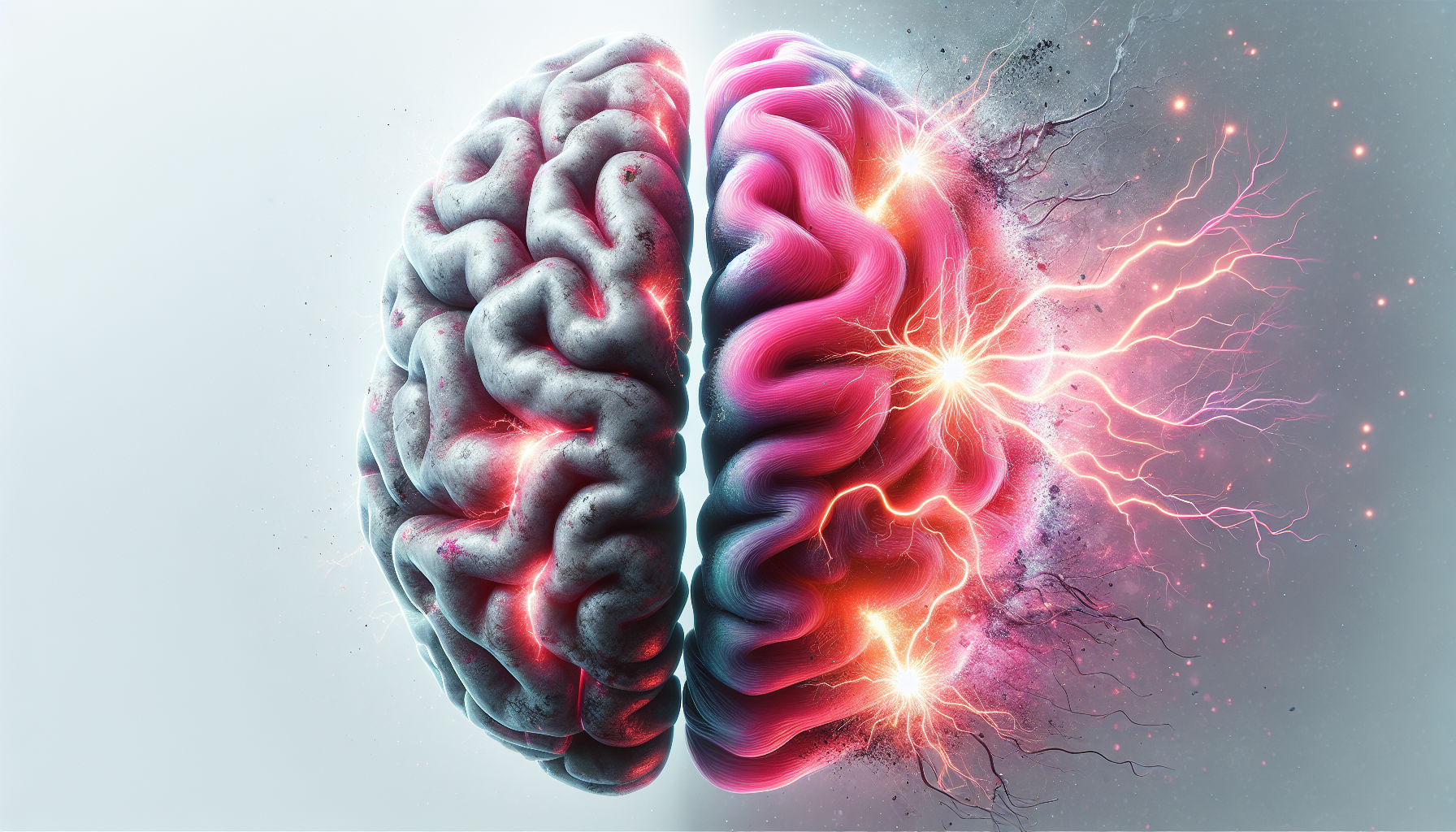Understanding the Long Term Effects of Concussion on Brain Health
Welcome to our in-depth exploration of the long term effects of concussion on brain health. While concussions are often brushed off as minor injuries, emerging research suggests they can have far-reaching and lasting impacts on our cognitive and emotional well-being. So, let’s dive deeper and unravel the hidden truths about the potential repercussions of this common head injury.
Key Takeaways
Post-concussion syndrome can lead to persistent cognitive issues such as memory loss, difficulties in concentration, and impaired executive functions that are crucial for daily tasks.
Concussions have considerable emotional and psychological impacts, including mood fluctuations, personality shifts, and increased aggression, which can disrupt personal relationships and day-to-day life.
Repeated head trauma increases the risk of neurodegenerative conditions like CTE and Dementia, underscoring the need for early recognition and treatment of concussions.
Exploring the Persistent Impact of Concussions on Cognitive Health
Seemingly harmless immediate symptoms like headache, confusion, and temporary memory loss often mask the long-term consequences of a concussion, which is essentially a mild traumatic brain injury. However, around 50% of concussion patients continue to exhibit persistent post concussive symptoms even six months after the initial occurrence.
These can include cognitive impairments such as memory loss, challenges in information processing, and difficulties in concentration, among others.
Memory and Attention Deficits
Disruptions in daily routines and cognitive activities frequently stem from memory and attention deficits, common cognitive impairments following a concussion. This is largely due to damage to the brain cells, impacting their ability to transfer information efficiently.
Heightened risk of dementia may result from repeated head impacts, which can contribute to a decline in cognitive reserve and increase vulnerability to neurodegenerative disease processes.
Executive Function Challenges
Along with memory and attention, executive functions like problem-solving and decision-making can also be affected by a concussion. These functions are crucial for daily life tasks, from planning a meal to managing a work project. Impairment of critical cognitive functions can result from concussions, leading to difficulties in:
Critical thinking
Reasoning
Judgment
Self-monitoring
This can make even simple problem-solving tasks daunting.
The Emotional and Psychological Toll of Post-Concussion Syndrome
While cognitive impairments are an undeniable concern, the emotional and psychological impacts of post-concussion syndrome are equally significant. These may manifest as:
Mood fluctuations
Changes in personality
Heightened aggression
Challenges in emotional regulation
These severe symptoms can distress the affected individuals and their loved ones, so it’s important to seek medical attention.
Navigating Mood Fluctuations
Post-concussion syndrome often involves mood fluctuations, such as irritability and depression, which can persist for an extended period. The disruption in the brain’s emotional centers can alter the expression and experience of emotions, leading to behavioral and emotional difficulties.
Personality Shifts and Behavioral Changes
Post-concussion effects can also trigger:
Personality shifts
Behavioral changes
Social anxiety
Mood swings
Increased aggression
Lack of emotional warmth
Feelings of dissatisfaction in relationships
These changes can significantly impact daily functioning, affecting work, academics, physical activity, and sleep.
Neurodegenerative Risks Associated With Repeated Head Trauma
Repeated head trauma, such as multiple concussions, can increase the risk of neurodegenerative conditions like chronic traumatic encephalopathy (CTE) and Dementia. The connection between these conditions and brain injuries, including concussions, is a critical part of the conversation, as it underscores the fact that concussions are not merely temporary setbacks but could potentially lead to serious neurodegenerative risks in the long run.
Chronic Traumatic Encephalopathy (CTE)
Chronic Traumatic Encephalopathy (CTE) is a progressive brain condition resulting from repetitive head injuries, such as concussions, which triggers the demise of nerve cells in the brain. Its manifestations encompass:
Depression
Anxiety
Impulsive behavior
Aggression
Short-term memory loss
among other symptoms.
The population-based prevalence of CTE is currently uncertain, yet it is a significant concern among individuals with a history of repetitive concussion or head-impact exposure.
Alzheimer's Disease and Other Conditions
Alongside CTE, there’s an elevated likelihood of developing Alzheimer’s Disease with repeated head trauma. Following a concussion, the risk of developing dementia notably increases by four to six times within the first year, making it a significant risk factor for cognitive decline.
This correlation emphasizes the importance of recognizing and addressing concussions in their early stages to mitigate the potential long-term neurodegenerative outcomes.
Physical Symptoms That May Linger After a Concussion
Beyond cognitive and emotional impacts, concussions can lead to various physical symptoms. Some common physical symptoms include:
Dizziness
Balance problems
Nausea
Unsteady gait
These symptoms may endure after a concussion and can be debilitating.
Persistent Headaches and Migraines
Headaches and migraines are among the most common physical symptoms that persist long after a concussion. These headaches often resemble tension-type headaches or migraines, presenting symptoms such as:
light and noise sensitivity
nausea
dizziness
reduced concentration
The occurrence of multiple concussions can heighten both the frequency and severity of headaches and migraines.
Sleep Quality and Fatigue
Sleep disturbances frequently occur after a concussion, impacting the individual’s ability to achieve adequate rest. Concussions can lead to persistent or intermittent fatigue, which differs from typical fatigue.
Poor sleep quality can worsen other concussion symptoms, impairing cognitive function, increasing fatigue, and prolonging recovery time.
Recognizing and Managing Post-Concussion Syndrome
Identifying and managing post-concussion syndrome is a crucial aspect of long-term recovery. This syndrome is characterized by prolonged effects of a concussion lasting three months or longer, with symptoms including:
Brain fog
Fatigue
Alterations in vision
Identifying Post-Concussion Syndrome
Proper diagnosis and treatment of post-concussion syndrome require recognizing its signs and symptoms. These include:
Dizziness
Concentration and memory issues
Brain fog
Fatigue
Sleep disturbances
Vision impairments
Treatment Approaches for Long-Term Recovery
A combination of neurologically based chiropractic care, mental health counseling and Hyperbaric Oxygen therapy often form successful treatment approaches for long-term recovery from concussions. These treatments aim to target specific problem areas, alleviate discomfort, and support a seamless recovery journey. Our doctors at Clarity can help determine which of the above treatments will work best for young adults.
The Cumulative Effect of Multiple Concussions
When repeated concussions occur in close succession, they can have cumulative effects, escalating the severity of symptoms and potentially resulting in long-term effects such as dementia-like symptoms and chronic traumatic encephalopathy (CTE).
Increased Severity of Symptoms
The severity of symptoms can increase with each subsequent concussion, making proper management crucial. Subsequent concussions can lead to an exacerbation of symptoms, particularly headaches, dizziness, and challenges with concentration and memory.
The Importance of Return-to-Play Protocols
Implementing return-to-play protocols can help reduce the risk of additional concussions and long-term effects. These protocols offer a structured framework for a safe and gradual return to physical activity, ensuring that the individual has fully recovered from their injury.
Preventative Measures and Risk Reduction Strategies
Minimizing the impact of concussions on brain health hinges on preventative measures and risk reduction strategies. These include:
wearing appropriately fitted and well-maintained protective equipment during sports and recreational activities
adhering to the rules of the game
demonstrating good sportsmanship.
Using protective headgear in activities such as bicycling or motorcycling.
Protective Gear and Safe Practices
Wearing protective gear and practicing safe techniques can help reduce the risk of concussion in sports and recreational activities. The most effective types of protective gear for preventing concussions in sports are helmets and headgear. That being said, in our experience helmets can be a harm in some cases. Often times too much trust will be put into the helmet, and we see more contact sports using the head as a leading point of contact. In this style of play, helmets lead to more concussion symptoms.
Educating Athletes and Coaches
Educating athletes, coaches, and parents about concussion symptoms and management can help promote a safer environment and minimize long-term effects. Coaches should possess knowledge about:
The cause of concussions
Symptoms exhibited by the athlete
Recommendations for physical and cognitive rest
Protocols for returning to play
Summary
In conclusion, concussions are not just temporary setbacks but could potentially lead to serious long-term cognitive, emotional, and physical effects. By understanding these effects, recognizing the symptoms early, and implementing effective management strategies, we can mitigate the impact of concussions on our brain health and overall well-being.
Frequently Asked Questions
Can concussion cause long term problems?
Yes, concussions can cause long-term problems, such as post-concussion syndrome which can result in symptoms lasting longer than expected, including headaches, dizziness, and cognitive issues. These symptoms may persist for weeks to months and even forever if treatment is never sought after.
Does post-concussion syndrome go away?
For the majority of people, post-concussion syndrome does go away, but it may take months or even years to fully resolve. In some cases, symptoms can persist beyond three months, requiring ongoing management.
How long do concussions take to heal?
Concussion recovery time can vary, but most symptoms resolve within 14 to 21 days if treatment is acquired immediately. However, it's important to seek medical attention if symptoms persist or worsen after returning to regular activities.
What is undiagnosed post-concussion syndrome?
Undiagnosed post-concussion syndrome refers to persistent symptoms experienced three months or more after a head injury, such as headaches, fatigue, memory issues, and more. It is important to seek medical evaluation for these symptoms to receive appropriate care.
What are the long-term cognitive impairments associated with concussions?
Long-term cognitive impairments associated with concussions may include symptoms like brain fog, memory loss, challenges in concentration, and diminished problem-solving abilities. These can have a lasting impact on an individual's cognitive function.
What supplements can help my brain heal?
Supplements high in alpha gpc or nootropics would be a great option. We personally recommended this nootropic from mindright. Other great options are mushrooms and other adaptogenic plants like ashwagandha.








